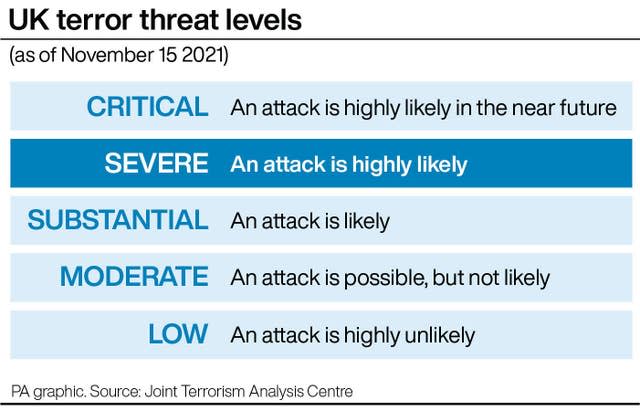UK terror threat level raised after two attacks in a month
The UK’s terrorism threat level has been raised after two attacks in the space of a month.
It is now listed as “severe”, which means an attack is “highly likely”.
The threat level had been lowered to “substantial” in February, meaning an attack is “likely”, after being raised to severe in November last year.
The Joint Terrorism Analysis Centre and MI5 are responsible for setting the international and domestic threat levels respectively, taking into account available intelligence, terrorist intentions and capability as well as potential timescales for attacks.
Speaking to broadcasters, Home Secretary Priti Patel said: “The Joint Terrorism Analysis Centre, Jtac, are now increasing the United Kingdom’s threat level from substantial to severe.
“And there’s a reason for that, and that reason is because what we saw yesterday is the second incident in a month.”
The car explosion outside a Liverpool hospital on Remembrance Sunday has been declared a terrorist attack by police.
It comes after Conservative MP for Southend West Sir David Amess died during a constituency surgery in Leigh-on-Sea in Essex on October 15.
Alleged terrorist Ali Harbi Ali, 25, is accused of murdering the MP and has also been charged with preparing acts of terrorism between May 1 2019 and September 28 this year.
Ms Patel said the “context” of there being two terrorist incidents in the space of a month was “really important” and while she could not expand “for obvious reasons”, she added: “I should just conclude my remarks by saying that our security and intelligence services prevent all sorts of acts, day in, day out.

“And of course, they understand the landscape, they see context, they see all sorts of things that keep our country safe and secure every single day and that work will continue.”
Official sources told the PA news agency the decision to raise the terror threat level should not be taken as an indication of any further specific live threat.
Deputy Assistant Commissioner Matt Twist, one of Counter Terrorism Policing’s senior national co-ordinators, said the change was a “precautionary measure and not based on any specific threat”, adding that the public “should not be alarmed by this change”.
While there was “absolutely nothing to suggest any link” between the two attacks, the fact they occurred in “relatively quick succession” will have “contributed to the intelligence picture that is continually being assessed”, he said.
Counter-terror police previously warned of the dangers of more people potentially becoming radicalised during the coronavirus lockdowns while spending more time online.
Although officers in charge of this probe have so far said the motive behind the attack is unclear.


